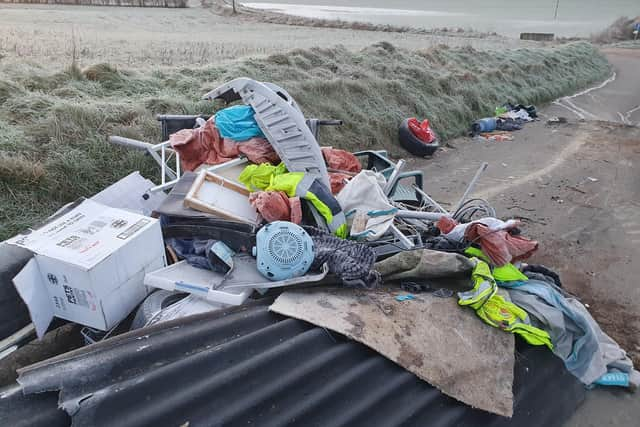Fly-tipping in Sussex: the worst-affected areas
and live on Freeview channel 276
The Defra figures showed councils dealt with 1.1-million fly-tipping incidents in 2021/2022 – though these figures only account for waste illegally dumped on public land that was reported to the authorities.
Across Sussex, there were more than 12,000 reports of fly-tipping in 2021/2022.
Advertisement
Hide AdAdvertisement
Hide AdWith 1,732 reports, Crawley had the highest number of fly-tipping incidents. The borough was also worst for incidents per 1,000 people, at 14.6.


But the Arun district was not far behind, with 1,713 incidents, 10.4 per 1,000 people.
Brighton & Hove had the third-highest total, with 1,585 fly-tipping incidents – although it was among the best in Sussex for incidents per 1,000 people, at 5.7.
The Lewes district had the lowest total incidents in Sussex, with 315, and the second-lowest number of incidents per 1,000 people after Mid Sussex, at just 3.1. Mid Sussex had the second-lowest number of total incidents, at 420.
Advertisement
Hide AdAdvertisement
Hide AdFigures for the rest of Sussex’s districts and boroughs were: Chichester – 1,372 (11 per 1,000 residents); Horsham – 1,102 (7.5); Rother – 928 (9.9); Adur – 845 (13.1); Eastbourne – 778 (7.7); Worthing – 688 (6.2); Wealden (637) and Hastings – 574 (6.3).
Despite strict rules on the disposal of asbestos, there were more than 200 reports of it being dumped.
Chichester was worst-affected, with 83 incidents. Horsham was second with 35, Arun third with 31, Crawley fourth with 27 and Wealden fifth with 19.
There were nine reports of asbestos being dumped in Rother, two each in Adur, Brighton & Hove and Mid Sussex, while there were no incidents reported in Eastbourne, Hastings, Lewes and Worthing.
Advertisement
Hide AdAdvertisement
Hide AdRepresenting some 27,000 rural businesses across England and Wales, the Country Land & Business Association (CLA) believes the figures only tell half the story.
It said many fly-tipping incidents occur on privately-owned land, painting an even more damaging picture of the financial burden and environmental impact fly-tipping brings. One CLA member is so badly affected he pays £50,000 a year for dumped waste to be cleared.
The CLA wants a change to the current fining and imprisonment laws, which it says are not often enforced and do not deter criminals.
CLA South East represents thousands of farmers, landowners and rural businesses, including many in Sussex.
Advertisement
Hide AdAdvertisement
Hide AdRegional Director Tim Bamford said: “These fly-tipping figures barely scratch the surface of a crime that’s blighting rural communities and damaging the rural economy. Two-thirds of all farmers and landowners have at some stage been a victim.
“But hundreds of thousands of offences on private land are going unrecorded, with farmers bearing the cost of removing rubbish themselves.
“It’s not just the odd piece of litter blotting the landscape, but tonnes of household and commercial waste which can often be hazardous – even including asbestos and chemicals – risking the safety of people and animals. This often requires costly expert treatment to remove.
“The maximum fine for fly-tipping is £50,000 or 12 months in prison, but this is rarely enforced. This means landowners pay on average £1,000 to remove the waste, but in some cases have paid up to £100,000 to clear up other people’s mess, or risk facing prosecution themselves.
Advertisement
Hide AdAdvertisement
Hide Ad“It seems that criminals simply do not fear prosecution. Ministers should look urgently at increasing the penalties for convicted fly-tippers, and properly resource rural police forces to ensure they are held to account. Without more progress farmers, not the criminals, will continue to pay the price.”
For more information about the CLA and its work, visit www.cla.org.uk/in-your-area/south-east and follow @CLASouthEast on Twitter.